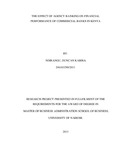| dc.description.abstract | The study was informed by introduction of agency banking into the banking industry and
the upsurge of agent outlets in this industry. The main issue was that there had been a
dramatic rise in customer numbers and value of transactions carried out by the new
service. The profitability of the banking sector has also been on the rise. So, the empirical
problem was whether there exists a relationship between Agent activities in terms of the
value transacted and banks profitability. Most studies made have looked at the adoption
of agency banking also referred to as branchless banking and its contribution to financial
inclusion. This study was meant to close the huge gap on studies looking at the financial
aspect of banks in terms of loans repayments, deposits, liquidity, withdrawals, and
number of customers, operating costs, coverage, and operational risks among others.
Questions still remain unanswered on agency banking and why commercial banks are
venturing into the new model of business, what are the advantages and disadvantages.
The purpose of the study was to determine the effect of agency banking on financial
performance of commercial banks in Kenya.
The research design took the form of a census that covered 100% of the banks that are
licensed to operate agency banking as at December 31st 2012 .The Population of the
study was 44 banks licensed to operate in Kenya while the sample contained 10 banks
operating agency banking as at the time of the research time frame. The study carried out
used regression analysis to find the relationship between agency banking in terms of
number of agents and the volume of deposit, withdrawals and loan repayment
transactions undertaken through agents and the financial performance of banks as
measured by return on equity. Regression analysis was carried to distinguish the
relationship between the parameters to be measured and the dependent variable using
statistical package for social sciences (SPSS) version 20.
The study carried out shed light on the fact that the number of agents operated by a
commercial banks and the resultant volume of transactions (Deposits and withdrawals)
are not directly correlated with the banks financial performance as measured by the return
on equity. This is further supported by the fact that the R Square for both 2011 and 2012
are considerably low indicating a weak correlation between the predictors and the
independent variables as highlighted in the regression analysis models. Predictor
variables are said to be correlated if their coefficient of correlations is greater than 0.5. As
shown in the final tables above for both 2011 and 2012 there coefficients are not more
than 0.5 standing at 0.518 and 0.915 respectively .This attributes that other factors not
put in the scope of the study highly contribute the financial performance of commercial
banks operating agency banking. Key recommendations were to have greater supervision
in the new service segment, banks to allow agents to perform core activities to efficiently
utilize their capabilities and enhance security for the agents to ensure they can handle
even greater volumes of cash and penetrate deep into the society. | en |

